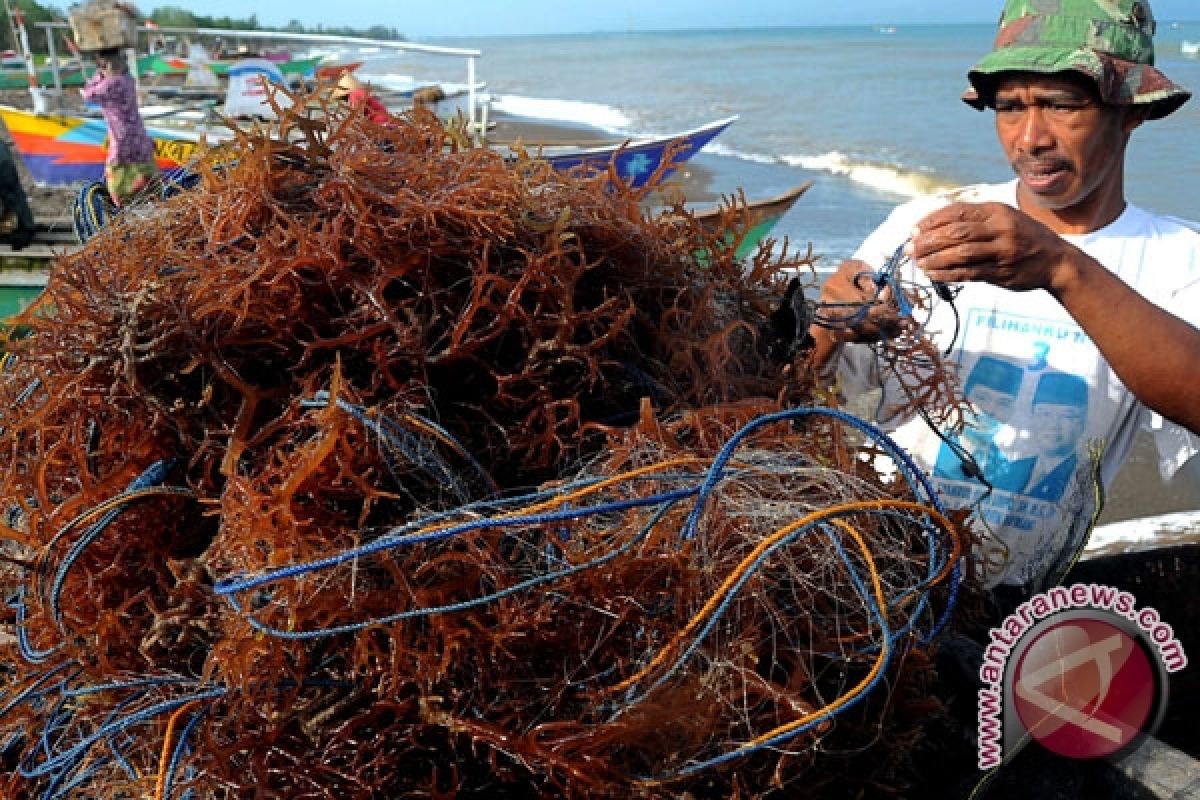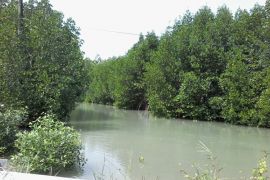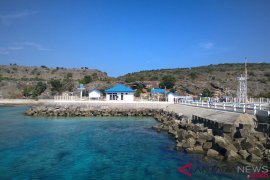"Indonesian waters as the tropical region has a seaweed germplasm resource..."Jakarta (ANTARA News) - The International Seaweed Association (ISA) has selected Indonesia to host the 21st International Seaweed Symposium (ISS) from April 21-26, 2013.
Themed "Seaweed Science for Sustainable Prosperity", the symposium will be held at Nusa Dua Convention Center in the Indonesian island resort of Bali.
"After waiting for almost 20 years, finally the 21st ISS will take place on April 21-26, 2013, at Nusa Dua Convention Center (BNDCC) in Bali," the National Organizing Committee chairman Safari Azis said in a written statement on Monday.
Safari is concurrently Indonesian Seaweed Association (ARLI) chairman.
He explained that seaweed was a primary commodity of coastal community and the people in Nusa Penida islands, Bali, that has improved their economy.
Bali was the first place where extensive commercial seaweed farming began in Indonesia about thirty years ago.
Since then the cultivation and processing of seaweeds has become a significant industry that provides income for tens of thousands of people in coastal communities throughout the country.
Currently the Indonesian seaweed industry is primarily based on seaweeds that serve as raw material for carrageenans and agars.
Although a processing industry has developed in Indonesia, most cultivated seaweeds are still exported as raw, dried seaweeds.
With its vast geographic, natural and human resources there is tremendous scope for diversification and expansion of seaweed-based industries in Indonesia.
In order to make that happen it is necessary to mobilize `seaweed science for sustainable prosperity` and that is the theme for the 21st International Seaweed Symposium.
"Therefore we want to have better communication and coordination with the government in our effort to realize seaweed industrialization program," Safari said.
He also expressed hope that a harmony between tourism and seaweed cultivation areas at the coastal regions and small islands would soon materialize.
In the 21st International Seaweed Symposium website: http://xxiseaweedsymposium.org/ the International Seaweed Association President Iain C. Neish said the ISS has been the foremost international symposium for individuals and organizations involved with seaweed research and utilization.
He said the ISS provides a forum for scientists, technologists, business people and resource managers to present their latest research results, exchange ideas and develop synergies.
"The 21st ISS in Bali will be held in the heart of the Coral Triangle where seaweed farming employs tens of thousands of coastal people," Neish said.
The symposium will be hosted by an Indonesian National Organizing Committee that is comprised of leading scientists and business people from private, academic and public sector organizations that are engaged in Indonesian seaweed science and utilization.
It will be supported by the Ministry of Marine Affairs and Fisheries, Ministry of Development of Disadvantaged Regions, Ministry of Tourism and Creative Economy, Indonesia Chamber of Commerce and Industry, Bali Chamber of Commerce and Industry, Government of Bali Province, Government of Badung Regency, Government of Klungkung Regency, Universitas Bakrie, Association of Indonesia Seaweed (ARLI), Association of Indonesian Seaweed Farmers and Cultivation Management (ASPPERLI), Commission of Seaweed Indonesia (KRLI).
Minister of Marine Affairs and Fisheries Sharif C Sutardjo said Indonesia has a strategic geographic location at the heart of Coral Triangle Zone.
"Indonesian waters as the tropical region has a seaweed germplasm resource of no less than 555 types such as types of Gracilaria, Gelidium, Eucheuma, Hypnea, Sargassum, and Turbinaria," the minister said in his message to the International Seaweed Association.
Sharif in his message extended his gratitude to the International Seaweed Association which has agreed the implementation of the 21st International Seaweed Symposium in Nusa Dua, Bali.
According to the minister, the potential for aquaculture in Indonesia is very high, including areas for seaweed cultivation which is estimated at 1,110,900 hectares, so the opportunity to developing seaweed production and industry is enormous.
He said the determination of Indonesia as the host of the 21st International Seaweed Symposium, was the right choice, not only because of endowed with an abundance of seaweed products, Indonesia also have seaweed farmers, researchers, academics and agencies related.
Sharif said the government has supporting to the development of the seaweed industry through the policies to increase the production of seaweed cultivation, up to 10 million tons in 2014, in a policy framework called seaweed industrialization.
"Seaweed industrialization is an integrated activity between the management of cultivation, seed availability, socio-economic, post harvest management, and capital to marketing," he noted.
Further, he added that it was organized in an integrated manner based on industries to increase value added, efficiency and competitive production scale so that the implementation may involve many people, both government and private.
"The purpose of policy is not only to increase foreign exchange, but also to provide jobs and prosperity for seaweed farmers and to promote the seaweed cultivation enterprises for micro, small, and medium scale," he went on.
Sharif noted that it was an honor for Indonesia to host the international seaweed symposium, and therefore he expressed hope that all participants will be able to share information, ideas, suggestion, and feedback about seaweed.
He said the symposium would also be very useful very useful for the advancement of sustainable seaweed industry in Indonesia in the future.
Seaweed has become increasingly popular, primarily for its nutritional benefits and also its low calorie count.
According to the US Department of Agriculture Nutrient Database, dried seaweed is rich in vitamin K that protect against osteoporosis and prevents cell damage by fighting against free radicals created from the breakdown of food.
Dried seaweed is also rich in iodine and magnesium, essential for human life. Without it, human body cannot synthesize thyroid hormones, which regulate metabolism and play a role in many body functions.
(Uu.O001/A014)
Reporter: by Otniel Tamindael
Editor: Priyambodo RH
Copyright © ANTARA 2013












